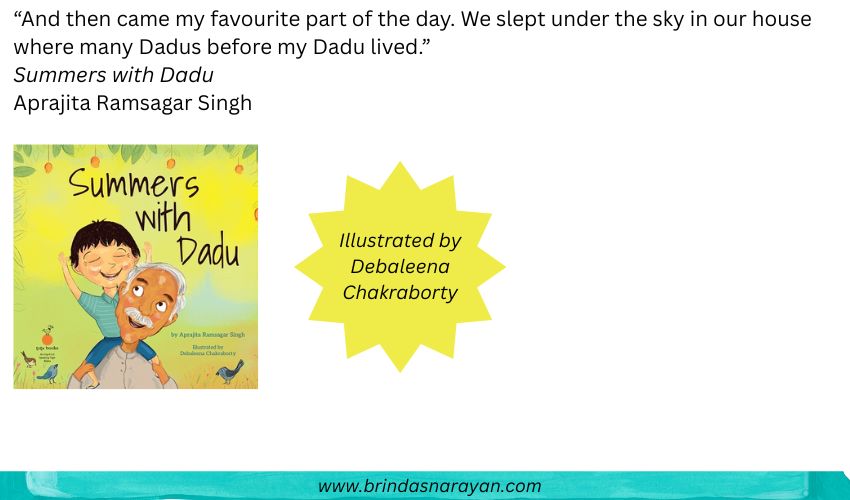
Mortality and Mangoes with Dadu
This is a perennial question: how do you explain death to a child? Many families are not privileged enough to wrestle with the question before they are plunged into an experience that the child has to grapple with anyway. For others, even if adults shy away from the topic, children are likely to contend with the terrors of oblivion in their preschool years. After all, they watch other life forms perish: insects, fish, birds, animals. Or human beings, on screens. Summers With Dadu is a gentle easing into the idea of a loved one’s vanishing.
Little Anand spends many sumptuous summers with his Dadu and Ajji, scrounging into Dadu’s kurta pockets for expected treats – “[m]ishri, batasha, coins and my favorite ‘lollipop’” – scurrying into the kitchen for Ajji’s yummy poori and aloo bhujia. Then slaying Dadu at a mango-eating contest. It’s an idyllic world, shielded from city honks and adult chaos.
At night, in the comfort of Dadu’s arms, sleeping on the open terrace, terrifying, existential questions are probed. Dadu points to ancestors – earlier Dadus – who have already morphed into stars.
“Will I also become a star, Dadu?” asks Anand.
“Of course you will, Anand. But that is a very long… long… time away.”
Anand is reassured by the thought of many more summers with Dadu, but that is not to be. Twinkly-eyed Dadu dies, and Anand returns to Dadu’s house with a laden heart, to confront the universe with its Dadu-shaped hole. Fortunately, Ajji repeats the much-awaited rituals, filling Dadu’s folded kurta with Anand’s favorite treats.
This is a sensitive read for children aged 4-years and above to reassure them that the sky will twinkle back with kindness after anchoring figures disappear. It’s suffused with details – the sight of a dargah from a terrace, the mango varieties redolent of Indian summers, the hot foods dished out by Ajji. All this is supported by illustrations that add to the scene. Like the intergenerational trio being seated on the floor in sukhasana, with their meals served on small stools. Birds peck at tidbits near the cold-water well. The car ferries colorful suitcases, signifying the fleetingness and reprieve of a getaway.
More significantly, the text and the drawings swivel our gaze to awe-inspiring night skies, reminding us that every child is a star. From the skies they are born and to the skies they shall return. Folks don’t disappear. They live on in rituals, in objects that stir emotions, in shared remembrances. Just as there are no summers without winters, no nights without days, no joy without grief, all experiences are marked by flip-sides. Loss is coded into our every days, but it takes children and their grandparents to intuit the lightness of being.
After Dadu’s death, Ajji hands over a letter from him. It contains a message: “The secret to knowing your stars.” With the infinite wisdom that proximity to death grants him, Dadu says: “The ones who are yours will always smile back at you.” It’s a dispatch that can also help grumpy adults. If you’re worried or sad, search for smiley stars.
References
Aprajita Ramsagar Singh (Illustrated by Debaleena Chakraborty), Summers with Dadu, Tota books, Speaking Tiger, 2025




